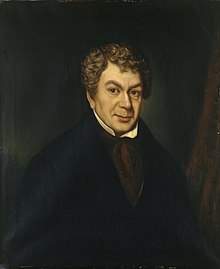David Owen (poet)

David Owen (born June 1784 in Llanystumdwy , Gwynedd ; † January 17, 1841 ibid), better known as Dewi Wyn o Eifion [ dɛui uɪn o ˈɛiwjɔn ], was a Welsh farmer and poet who was considered one of the best bards of his time .
Life
David Owen was born to wealthy farmers on Farm Gaerwen in Llanystumdwy, Eifionydd constituency , and attended private schools in nearby Penmorfa and Bangor-on-Dee . He spent most of his life as a farmer on his parents' farm. In 1827 he moved to Pwllheli , where he worked for ten years with the poet Robert Williams ( Welsh Robert ap Gwilym Ddu ). In 1837 he moved back to Gaerwen, where he lived until his death. His grave is in the Llangybi churchyard near Pwllheli.
Awards
In 1805 he won the Gwyneddigion Medal at the Eisteddfod of Gwynedd with his ode to the island of Great Britain "Molawd Ynys Prydain" and became famous at once . In 1811 he won the Tremadog Eisteddfod with an ode to agriculture. His most famous work is the Ode Elusengarwch ("Charity"), with which he took part in the Eisteddfod of Denbigh in 1819 , but was defeated there by Edward Hughes . Owen never accepted this defeat and since then has participated in Eisteddfodau much less often. His last major work was an epic poem about the Menai Bridge , which he published in 1835.
Web links
- Dewi Wyn o Eifion on the National Library of Wales website , accessed April 13, 2011
- TR Roberts and R. Williams. Eminent Welshmen , Cardiff 1908, Retrieved April 13, 2011
Individual evidence
- ↑ Diocese of Bangor: Deanery of Llŷn & Eifionydd ( Memento of the original from June 7, 2011 in the Internet Archive ) Info: The archive link was inserted automatically and has not yet been checked. Please check the original and archive link according to the instructions and then remove this notice. , accessed April 13, 2011
| personal data | |
|---|---|
| SURNAME | Owen, David |
| ALTERNATIVE NAMES | Dewi Wyn o Eifion |
| BRIEF DESCRIPTION | Welsh poet and bard |
| DATE OF BIRTH | June 1784 |
| PLACE OF BIRTH | Llanystumdwy , Gwynedd , Wales |
| DATE OF DEATH | January 17, 1841 |
| Place of death | Llanystumdwy , Gwynedd , Wales |
